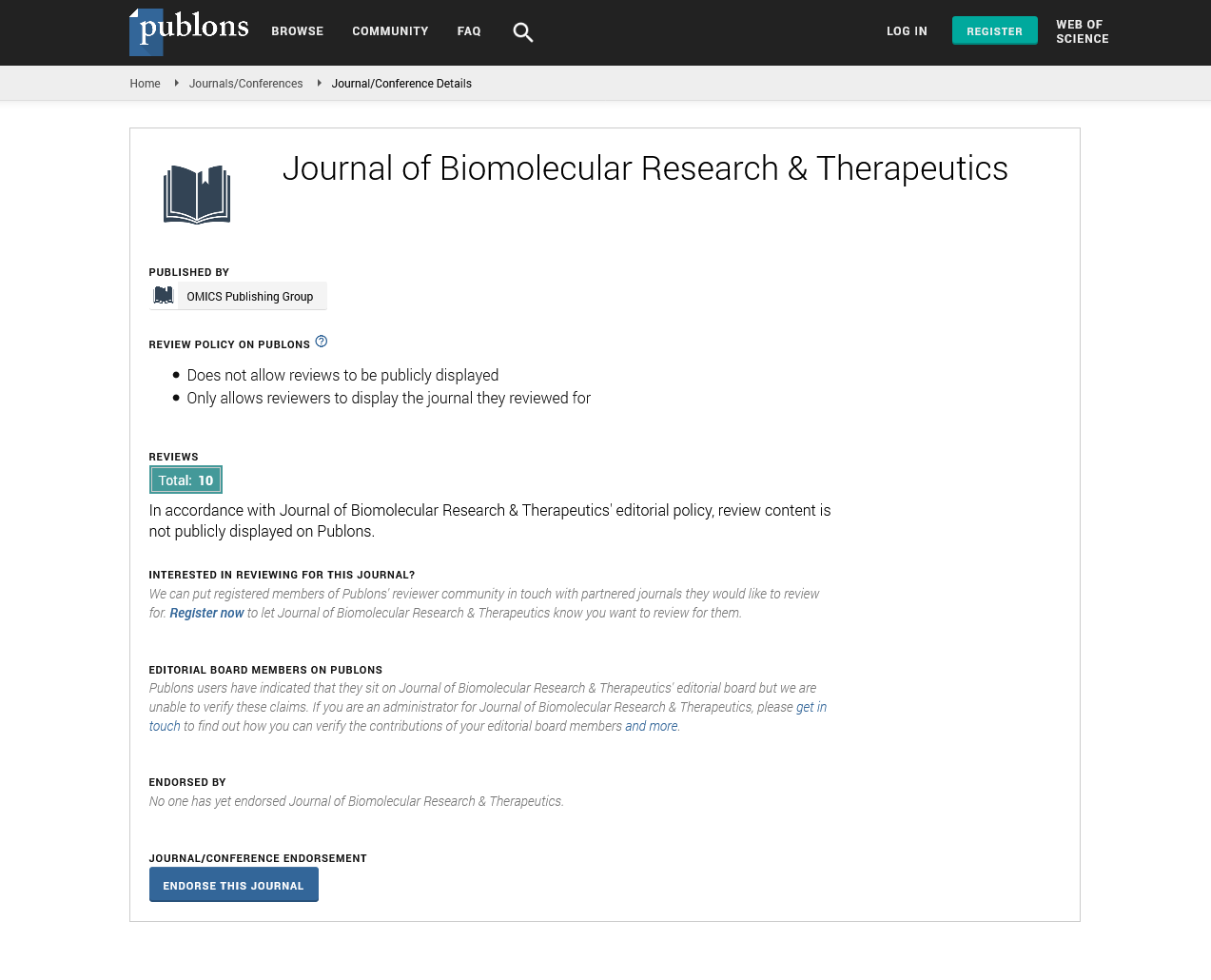Indexed In
- Open J Gate
- Genamics JournalSeek
- ResearchBible
- Electronic Journals Library
- RefSeek
- Hamdard University
- EBSCO A-Z
- OCLC- WorldCat
- SWB online catalog
- Virtual Library of Biology (vifabio)
- Publons
- Euro Pub
- Google Scholar
Useful Links
Share This Page
Journal Flyer

Open Access Journals
- Agri and Aquaculture
- Biochemistry
- Bioinformatics & Systems Biology
- Business & Management
- Chemistry
- Clinical Sciences
- Engineering
- Food & Nutrition
- General Science
- Genetics & Molecular Biology
- Immunology & Microbiology
- Medical Sciences
- Neuroscience & Psychology
- Nursing & Health Care
- Pharmaceutical Sciences
Commentary - (2023) Volume 12, Issue 2
Semi Synthesis of Chemo Enzymatic Proteins in Biomolecules
Jason Brian*Received: 03-Feb-2023, Manuscript No. BOM-23-20717; Editor assigned: 06-Feb-2023, Pre QC No. BOM-23-20717(PQ); Reviewed: 21-Feb-2023, QC No. BOM-23-20717; Revised: 28-Feb-2023, Manuscript No. BOM-23-20717(R); Published: 07-Mar-2023, DOI: 10.35248/2167-7956.23.12.266
Description
Protein lipase production defined as the construction of a protein from a mixture of polymeric and recombinant components is a booming branch of molecular diagnostics that has influenced many areas of life science. It begins by examining the numerous chemical and enzymatic approaches for producing personalized proteins incorporating non-coded components that are presently available. The fundamental sequence of therapeutic proteins can be altered through site-directed genetic modification which involves genetically changing a position for any of the other protein genic amino acids. Enzyme mutagenesis has been widely utilized to evaluate structure-function connections and to enhance biological activity. Specific chemical identification of volatile amino acid chain reactions such as cysteine is usually utilized to change proteins with different chemical functions. Conversely utilizing synthetic biology technologies to insert different chemical side chains into a protein, ribosome integration of artificial organic molecules is a strong method. However, polysaccharide designing using natural biochemical and chemical peptide techniques provides the most partial and adaptive means of producing modified protein complexes capable of changing not only the glutamic acid side chains but also the molecular biology and of the fundamental peptide backbone. Fast polypeptide breakdown allows cells to alter proteins concentration quickly. Short-lived polypeptide deregulation is critical in diagnosis. A concentrated protein is still unknown.
Cycloheximide a transcriptional inhibitor is determining the kinetics of short-lived protein breakdown. Cycloheximide chase assays in conjunction with sophisticated quantification proteomic to inhibit by translating four cell types from humans. Proteome growth is the constant production and removal of polypeptides that is necessary for proper cellular activities. Rapid inhibition in particular, plays critical roles in a variety of physiological processes, involving cell cycle, cell signaling and transformation. Because protein synthesis is extremely slow fast protein breakdown is essential for achieving instantaneous shifts in protein abundance in relation to disruptions. Changes in the breakdown of illness-related proteins are frequently important in disease etiology. Cell growth phases, for instance are closely regulated by occurrence signaling pathways and regulators. Modern polypeptide parts manufacturing is similar to Biomolecular orthopedics. The polynucleotide backbone changed by inserting synthetic groups, components. Peptide obtaining nuclear is a branch of protein biotechnology that combines with chemical peptide synthesis. The former has made great breakthroughs due to chemical and artificial biology techniques the latter have been progressively enhanced. Hence, combining these two significant features in a single funnel. The usage of glutamic acid in polypeptide production of polymers has lately shifted to the specialized chemistry that can be performed at this amino acid. Selenocysteine, in instance can be transformed to glutamate or tyrosine by chemical desalinization under reductive or oxidative circumstances. Furthermore, oxidative sources can be classified in the presence of cysteine residues providing an option to sequencing for proteins with indigenous disulphide bonds. Selenate derivatives of proteinogenic amino acids have been produced in accordance with this technique for usage in ligation-desalinization chemistry. Simple sugars, enzymes, nucleic acids, lipids and other complex macromolecules make up living organisms. Proteins and sugars are necessary components of our diet. These proteins interact with one another and form the chemical logic of biological processes. Furthermore, simple compounds such as micronutrients and essential minerals play a vital part in the functioning of organisms.
Citation: Brian J (2023) Semi Synthesis of Chemo Enzymatic Proteins in Biomolecules. J Biol Res Ther. 12:266.
Copyright: © 2023 Brian J. This is an open access article distributed under the terms of the Creative Commons Attribution License, which permits unrestricted use, distribution, and reproduction in any medium, provided the original author and source are credited.

